Who Decides What’s for Dinner?
The Truth Behind Supplements
Sunjay Anekal
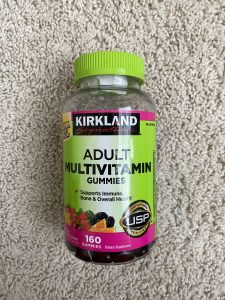
We all want to be strong, fit, immune from every disease known to mankind, and healthy in general. To accomplish such goals, some people resort to traditional methods such as exercising regularly, eating a well-balanced diet, and getting adequate sleep, as these three behaviors have been scientifically proven to improve all aspects of our health. However, many individuals use health supplements to make up for some of the deficiencies in their daily lives. I also fall into this category of using health supplements because I do not eat the healthiest foods, I do not get 7 hours of sleep every night, and I do not always have the time to exercise every day. The specific supplement I use to make up for my shortcomings is the Kirkland Multivitamin Gummies.
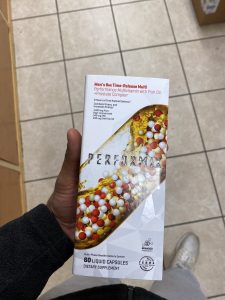
The labels on many of these supplements like the one I use claim that they can boost muscle function, bone strength, immune system function, energy levels, and overall health. However, the NIH website states that “The US Food and Drug Administration (FDA) does not determine whether dietary supplements are effective before they are marketed” (“What You Need to Know: Dietary Supplements”, 2020). This raises some concerns on the legitimacy of these products, their efficacy, and their safety. The main question we all should be asking is since there is a level of uncertainty about health supplements, is there information that the manufacturers do not present to the consumers? This refers to something known as information asymmetry. Information asymmetry occurs when consumers do not know the complete information about how a product is produced and what it contains. Many of the health supplements that are sold have the intention of solving health problems, but many of the unverified claims along with the chemicals present raise questions on the efficacy of health supplements. Due to the ambiguity present in the health supplements market, it may be best for the consumer to focus more on a healthy diet, adequate exercise, and proper sleep instead of on consuming supplements that have a lot of uncertainty surrounding them.
The Effects of Labeling and Advertising
In the industry of health supplements, the information asymmetry that is present is clearly shown in the labeling of health supplements. As shown below, some of the labels make very powerful claims on what they can do.
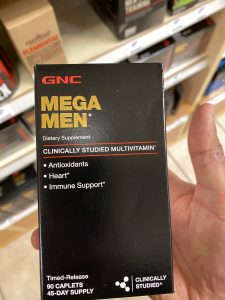
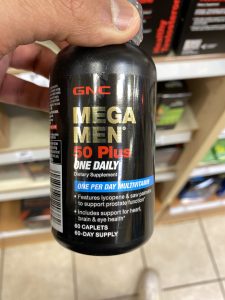
One of the products known as Mega Men by GNC claims to improve one’s health by providing antioxidants along with health and immune system support. The product label mentions that GNC did a randomized controlled study with this supplement and found improvements in serum levels of certain nutrients and improvements in the health of subjects. Another similar product known as Mega Men 50 plus claims to support prostate health, eye health, and brain health. The store clerk I interviewed at GNC mentioned that all of the products with the GNC label on it have been tested and approved by GNC. Many of the trials are on the GNC labels as was the case with the Mega Men product. The fact that these products sold at GNC have not been tested by an independent body such as the FDA raises questions on how these products work in the human body. The fact that the trials are done by GNC tells us that there may have been an inherent bias in the study setup. Therefore, the customer does not know to what extent the claims on the label about safety and efficacy are true because the company is running the tests themselves. Advertising is also another issue, as shown in this advertisement for Nugenix: https://www.youtube.com/watch?v=O1PE_13TJ5E. This ad shows a lot of incomplete information and does not include the statement that none of their claims have been approved by the FDA. This is concerning since consumers usually take in what they see in an ad and do not look beyond what is mentioned.
The Effects of the Ingredients
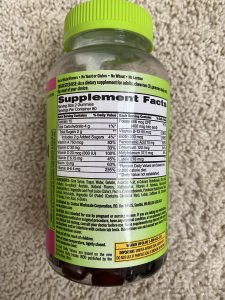
When discussing the issue of supplement labels and advertisements, it is important to look into the ingredients present and whether they have potential to do harm to the individual. The store clerk at GNC stated that all of the chemicals in the product are listed on the nutrition labels and that there are no ingredients added to the supplement that the user does not know about. Health supplement labels are always presenting the benefits of a particular product. If there is anything negative presented on the label, it is usually something along the lines of “This is not meant to serve as a dietary replacement” or “This is not intended to treat or cure any disease.” What the labels do not tell you is the dangers of some of the ingredients that they put into the product. Since the FDA only requires that the companies provide“Supplement companies are responsible for having evidence that their products are safe, and the label claims are truthful and not misleading.” – NIH evidence that supplements are safe, companies have an easier time controlling the evidence provided to the public and therefore, can mislead the consumer. Some of the chemicals found in dietary supplements that are harmful are in fact, the very reason many of us take them in the first place. They are vitamins and minerals. For example, a common vitamin found in many health supplements is vitamin A. We also get vitamin A from our diet. According to the NIH, excess vitamin A can lead to problems such as liver damage and decreased bone strength (“What You Need to Know: Dietary Supplements”, 2020). However, the labels do not warn you of the dangers of excess vitamin A. As a result, overconsumption of this vitamin is very much possible if you have enough vitamin A from your diet, but you take a supplement that gives you even more than what you need. The same danger lies with iron. Excess iron consumption can lead to liver damage (“What You Need to Know: Dietary Supplements”, 2020). The possible side effects from the overconsumption of these vitamins and minerals are something not explicitly mentioned on any of the supplement labels. Companies do not tell you that if you consume these supplements in excess or you overconsume a certain type of vitamin, it can lead to the problems mentioned by the NIH.
Supplement Efficacy
With this issue of safety comes another issue of companies not providing information on the product efficacy. The store clerk I interviewed at GNC mentioned that on average, 75-80 % of the customers are satisfied with their products. However, he did mention that the effectiveness of the products ultimately varies person by person. Even if the product advertises that it can boost muscle growth and improve immune function, the inherent physiology of the body and the interactions it has with the supplement will ultimately dictate whether or not the product is effective. Many of the labels state that you should only use the supplements if you are an adult and to exercise caution if you are pregnant or have allergies. It does not look into different people and how different people can have different interactions with the product. Of course, the label cannot list all of the possible interactions that can occur between the supplement and the body. However, this does show the level of information asymmetry present with respect to these products because the customer does not know whether or not this product will work for them. In fact, an article written in Today mentions that doctors have“Taking those pills does no harm, but offers no apparent advantage either, said Dr. David Jenkins, the study’s lead author and professor of nutritional sciences and medicine at the University of Toronto.” – Agnes Pawlowski said that the health supplements we buy are actually not doing us any good in helping out our health. The researchers examined 4 common health supplements: multivitamins, vitamin D, calcium, and vitamin C. They found that none of these supplements prevented problems such as heart disease, stroke, and heart attack (Pawlowski, 2018). They did not do any harm, but neither did they do any good. They found out that folic acid and B-vitamins can reduce the risk of stroke, but ingredients like niacin and antioxidants can increase the risk of death (Pawlowski, 2018). This information originated in a peer reviewed journal that did a meta-analysis over several randomized control trials. The journal article also found that vitamins such as A, B6, E, Beta-carotene, zinc, iron, magnesium, and selenium did not have a significant effect on cardiovascular disease and mortality from all causes (Jenkins, 2018). Of course, many supplement companies do not tell you the limited effects many of their products have because they want the consumer to buy it. They also do not tell you the dangers of some of the ingredients such as niacin and antioxidants. Their ability “Another study, published in July, confirmed earlier research showing that people who take supplements, including vitamins and minerals, do little or nothing to reduce their risk of heart disease.” – Agnes Pawlowskito keep this level of information asymmetry allows them to push the narrative that their products are effective and can result in drastic improvements in one’s life. We see this information asymmetry as being very effective because health supplements are increasingly popular. This lack of transparency will lead to more customers not getting the product they intended to pay for.
Final Thoughts
As consumers, it is important to know what we are buying into and whether the products that we buy have the effects that are stated on the label. This can pose a challenge to the average consumer like myself since companies almost never give the complete picture on any product. The research that I have done on this issue has led me to reconsider the benefits in taking these multivitamin gummies every night. My honest answer on whether I should take these gummies or not is I really do not know. Up until now, I have constantly told myself that I would see the benefits as time went on by taking these gummies. However, I do not know if this is the case anymore. After regularly taking these gummies, I do not feel like I have turned into a superhuman who has stronger muscles and can fight off any disease. I feel healthy like anyone else. However, is it due to these multivitamins that I take or instead, is it due to my diet, occasional exercise that I engage in, and my sleep schedule? Due to this uncertainty, I think it is important that consumers themselves take control of their own health and monitor what they put into their bodies. Until supplement manufacturers decide to reveal the truth behind their products, it may be best to stick to the proven methods of eating a well-balanced diet, getting at least 1 hour of exercise every day, and getting 7 hours of sleep every night. If you do take health supplements, it may be a good idea to monitor your health constantly and see whether you make the improvements that the labels promise. Most likely, I will still continue to take these multivitamins because they have not done any harm to me and they can make up for any of the vitamin deficiencies in my diet. However, I will probably not rely on them as much as I used to. With this approach, I am confident that I can lead a healthier life and not rely on a product that we do not know entirely about.
References
Jenkins, D. J., Spence, J. D., Giovannucci, E. L., Kim, Y. I., Josse, R., Vieth, R., … & Paquette, M. (2018). Supplemental vitamins and minerals for CVD prevention and treatment. Journal of the American College of Cardiology, 71(22), 2570-2584.
Office of Dietary Supplements – Dietary Supplements: What You Need to Know. (n.d.). Retrieved November 23, 2020, from https://ods.od.nih.gov/factsheets/WYNTK-Consumer/
Pawlowski, A. (2018, December 3).Do vitamins and supplements work? Doctors say no. TODAY.Com. https://www.today.com/health/vitamin-pills-supplements-don-t-help-most-people-doctors-say-t122663
QUALITY YOU CAN TRUST. (n.d.). Retrieved November 23, 2020, from https://www.gnc.com/quality-you-can-trust.html
stsinfomercialdrtv. (2019, March 11). Nugenix Commercial. https://www.youtube.com/watch?v=O1PE_13TJ5E.
